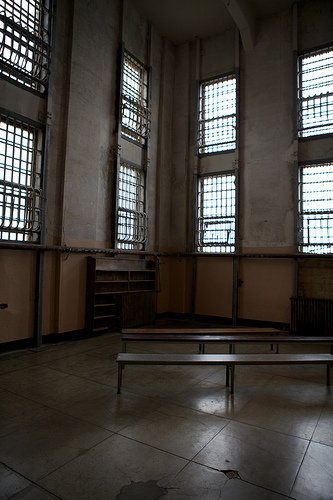The guard at the gate smiles a toothless smile, and lightly taps the security boom open for me. We recognize each other; him with his brown uniform and heavy automatic tucked into a pocket on the front of his bullet-proof jacket, me with my rusted car and naive wave.
A cold, overcast day. Mud everywhere; large tracks left behind in the red earth by construction vehicles engaged in a multimillion-rand upgrade of the old prison. The temporary entrance is an enormous, old, solid steel gate. A group of men and women sit or stand around outside, waiting to be noticed. I call through a crack on the side of the gate where the hinges sit. A guard inside recognizes me and opens the gate a fraction.
I slip through into a small, square courtyard that’s being hosed down by an old man in green trousers and shirt. There is a smell of something rotten in the air. And the overpowering sweet scent of marijuana. Above me, at one end of the square, are rows of narrow barred windows with scraps of washing hanging from them. In a corner of the high brick walls is a nest of bees. A swarm buzzes angrily in and out.

I’m directed to an old broken chair while someone shuffles off down an echoing corridor to find my contact. A dying bee lies on its back at my feet and buzzes feebly, its little wings beating out its last futile flight. People mill around; plainclothes policemen with armfuls of brown folders, warders (commonly referred to as “members”) with loud voices and crude jokes, and prisoners dressed in outfits of dark green and the requisite layer of attitude.
My contact arrives and I follow him inside. We go down a wide, sloping passageway. Everywhere we come across groups of prisoners washing the concrete floors. They have large plastic rubbish bins filled with hot, soapy water and old mops that slide up and down, up and down. The floors are incredibly slippery and I have to walk slowly, concentrating on each step. I’m still not used to the loud crashing noise of the electronic gates, and every time one opens or shuts behind us I jump. Groups of joking prisoners and their “members” join up with us at some of the gates. There are calls of, “Heita, majita”, all around. We proceed together, farther and deeper into the vast belly of this stone and steel beast. At some point we branch off from the others, and the members give a thumbs-up to each other. “Sharp, booda,” they call out in the ghetto slang of the prisoners.
Finally, we arrive at G-Section, brightly lit and brand new with orange walls and shiny aluminium-topped tables and benches. A ping-pong and pool table stand at one end of the large space. A double row of cells rings the room on two sides, with a large metal grille covering the front of the top row. Some men are sitting in the narrow walkway behind the grille, their feet hanging down. Most of the cells accommodate two men, some even three. When I enter most of the men (as well as a few members) are sitting in the open communal area watching a video. There’s a lot a noise and swearing coming from the television. It’s a Hollywood tale, apparently, about a gang of black girls who go around stealing cars and robbing banks.
I gather the group (between five to eight men) and we go upstairs to an empty cell, a small, hot room with a blanket thrown over the open gate for privacy. We talk slowly, and share slowly. It’s only our third meeting and the guys are unsure of my motives. I’m not too sure myself what I’m trying to prove. That the act of writing words down onto a sheet of unlined paper with a blunt regulation pencil can be meaningful, even emancipatory? That poetry can be relevant to these men’s lives, each of whom are probably serving an average of ten years for one or other form of violent crime? (I make it a rule never to inquire about their sentences or crime.) That poetry is not a luxury or a distraction from the viciousness of reality; that it is rather as basic as a wedge of unbuttered bread?
The room is becoming hotter. The absence of fresh air is beginning to have an effect on me. I feel light-headed. But the guys in their green pullovers seem accustomed to it. They are still and attentive.
I read slowly, and they re-read, translating the words of the South African poet, Wopko Jensma, for each other:
“i open the door and see no-one
i always open the door
i think i will wait
someone may come some day.”
Kobus Moolman is an award-winning South African poet and playwright.
Photo by Chris Chabot, from Flickr Creative Commons




